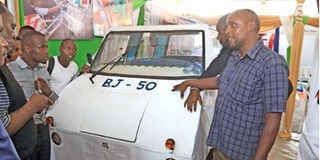Innovator on the cusp of selling homemade cars

Samuel Njogu (right) from Laikipia County explains how he made his four-wheeled rickshaw, during the devolution conference at Kirinyaga University on March 4, 2019. PHOTO | FILE | NATION MEDIA GROUP
What you need to know:
- The four-wheel tuk tuk uses a 200cc petrol motor cycle engine with a speed of 80 kilometres per hour.
- The vehicle will come in three models — a pickup with a capacity to carry 800 kilos, a seven-sitter passenger vehicle and a saloon car.
When I heard Samuel Njogu’s story, I immediately dismissed him as a day dreamer.
How could he think of making a car? Where would he get the materials and, worse, the money? Where would he sell it, given that Kenya imports all its vehicles?
For somebody who does not even have secondary school education, how would he manufacture an automobile with all the expertise and knowledge required to pull through a venture similar to one that a local university once tried and failed miserably?
These and many more sceptical questions ring in my mind when I meet Njogu in his workshop in Nyahururu.
And as he sets out to feed my curiosity, I discover that Njogu’s story is a lesson in resilience, inspiration and sheer determination in pursuit of one’s dreams.
His dalliance with machines started in 1996 when he bought an old Land Rover for ferrying farm produce to the market.
JUA KALI
But after only eight months, it was grounded. With the rising cost of fuel, he could not sustain the business.
He then turned to the Jua Kali sector and started making sufurias using scrap metal as raw material, earning an average of Sh20,000 per month. Smelting and turning metal into utensils was quite challenging. He had to move on.
He recalled that at one time he had made a motorcycle and the thought of designing a car struck him.
To the amazement of his friends, who thought he was running mad, in 2003 he made a rickety four-wheeler tuk tuk using a motorcycle engine and scrap metal, and used it to carry potatoes and carrots to the local markets.
“Every now and then I would get into trouble with traffic police officers. But they did not arrest me, only finding it funny. But they warned it was illegal to drive the tuk tuk on the road,” he chuckles with laughter.
“One day, one officer teased me that if I wanted to make money I should make one that would carry passengers. I took him seriously and laid down plans on how to actualise my dream.”
DEBUT
In 2010, Njogu bought a new motorcycle 200cc engine at Sh20,000 and kept it in his house as he mobilised resources to buy other materials.
What had started as a dream was slowly turning into reality as he bought bolts, sheets and wheels and other materials using proceeds from his fresh produce business.
In August 2017, a car he branded BJ-50 — signifying Kenya’s 50 years of independence — hit the road.
He carried a few passengers who dared live his dream, but most people declined his free ride.
Then one day while driving along the streets of Nyahururu, he bumped into Laikipia Governor Ndiritu Muriithi.
“He was impressed about my invention, so he jumped in and I drove him over a couple of metres. He asked if I could make him one; then I confidently said, ‘Oh yes governor, why not? I will so long as you pay me'. He laughed and asked me to see him in his office,” he says.
SELLING PRICE
The four-wheel tuk tuk uses a 200cc petrol motor cycle engine with a speed of 80 kilometres per hour, but there are plans of improving it to 100 kilometres per hour, he says; adding that the four-stroke, one piston engine has low fuel consumption.
Njogu explains the vehicle will come in three models — a pickup with a capacity to carry 800 kilos, a seven-sitter passenger vehicle and a saloon car.
Each unit costs about Sh350,000 to produce. And with a selling price of Sh450,000, he expects to make Sh100,000 per unit.
“Last year, the governor honoured his promise and paid a deposit of Sh200,000 for his car. Then Royal Media Services founder and chairman Samuel Macharia also ordered his and paid the full amount.
"This trust in me was very inspiring. I started working on the two units four months ago and I expect to deliver them next month,” Njogu says excitedly.
APPROVAL
The vehicles have already been inspected by the National Transport and Safety Authority (NTSA) and Kenya Bureau of Standards (Kebs) engineers who made recommendations on interior lighting, modification of the radiator and installation of the speedometer, which he is working on.
He is working in collaboration with Dedan Kimathi University of Science and Technology, which is assisting him in the development of a computer-aided design, a requirement by the NTSA and Kebs, as the agencies work on how to patent the invention and authorise production.





